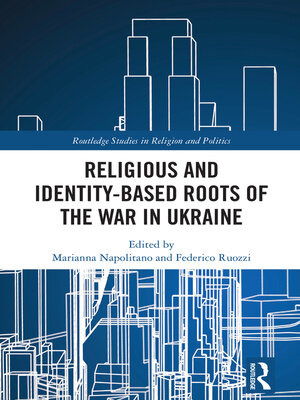Religious and Identity-Based Roots of the War in Ukraine
ebook ∣ Routledge Studies in Religion and Politics
By Marianna Napolitano

Sign up to save your library
With an OverDrive account, you can save your favorite libraries for at-a-glance information about availability. Find out more about OverDrive accounts.
Find this title in Libby, the library reading app by OverDrive.



Search for a digital library with this title
Title found at these libraries:
| Library Name | Distance |
|---|---|
| Loading... |
Religious and Identity-Based Roots of the War in Ukraine critically analyses the religious and identity-based roots of the Russo-Ukrainian War from a long-term historical perspective.
The book traces the elements that render this war not only geopolitical but also a conflict in which religion is instrumentalized to serve narratives of state power and identity formation in both post-soviet Russia and Ukraine. It explores the interplay between Church and State, the 'imperial' concept of Russkyi Mir (Russian world), and the dichotomy of traditional Slavic values versus modern Western globalisation. The book also examines the process that impacted the narrative of Orthodox identity after the Soviet Union, and its connection to the war. Furthermore, it explores the use of public history throughout the hostilities, offering a detailed analysis of the cultural aspects of the Russian-Ukrainian conflict, the construction of identities through monumentalisation and the role of art in engaging with the past. The perspectives of religious agents during the conflict are discussed, such as Patriarch Kirill's narrative of the gay parade as a threat to the Russian world, the Ukrainian Orthodox Church's declaration of independence from the Moscow Patriarchate, the peace mission of the Vatican and the Ecumenical Patriarch Bartholomew's defence of the right to recognise the independence of the Ukrainian Orthodox Church. Additionally, providing a long-term perspective, the book explores Church-State interplay in Russia from Nicholas II to El'tsin, as well as the consequences of the fall of the Soviet Union and possibilities for a dialogue of peace.
Religious and Identity-Based Roots of the War in Ukraine will be of great interest to advanced students and scholars of Contemporary History, Religious Studies, History of Christianity, Political Science, Russian Studies and Ukrainian Studies.







